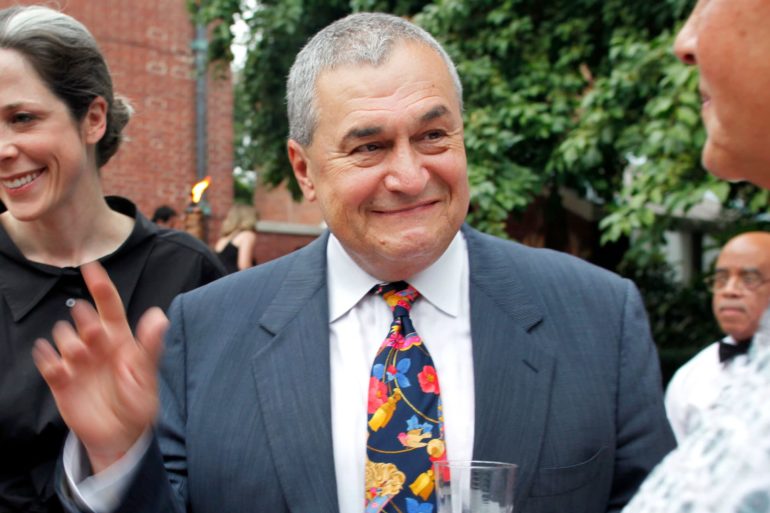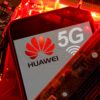Huawei, the Chinese tech giant that is on a U.S. trade blacklist, paid veteran Democratic lobbyist and donor Tony Podesta $500,000 to lobby the White House during the third quarter.
The disclosure comes as the Biden administration is facing pressure to keep Huawei on the blacklist, which restricts the company’s access to semiconductors. The lobbying took place between July and September.
The specifics of Podesta’s lobbying campaign for Huawei were not clear. Podesta and Huawei did not return requests for comment before publication.
The White House, in a response Thursday, criticized Huawei and said the company is still subject to trade restrictions.
“President Biden and this administration believe digital infrastructure equipment made by untrustworthy vendors, like Huawei, pose a threat to the security of the U.S., our allies, and our partners. Export controls against Huawei remain in place,” a White House official said, when asked about Podesta’s lobbying.
“We are committed to using the full range of our tools to keep us and our allies secure,” the official added. “We are engaging with all of our partners and allies on the risks posed by Huawei and dozens of countries and carriers have made the decision to exclude Huawei from their 5G networks. And we expect this trend to continue.”
CNBC Politics
Read more of CNBC’s politics coverage:
Huawei’s hiring of Podesta was previously reported, but the disclosure sheds new light on the longtime lobbyist’s dealings, including his hefty fee.
Podesta, who is known to have ties in the White House, registered to lobby for Huawei in July, according to a registration form. It marked his return to lobbying after he left the business in 2017 as his firm came under heavy scrutiny in special counsel Robert Mueller’s probe.
Podesta, according to the third quarter disclosure, targeted only the White House Office for Huawei last quarter. The disclosure form says it was for “issues related to telecommunication services and impacted trade issues.” The White House Office is run by the president’s chief of staff, who, in this case, is Ron Klain, another veteran Democratic power player.
A source familiar with the Podesta’s lobbying efforts for Huawei told CNBC that Klain was not contacted. This person declined to be identified in order to discuss a private matter.
For years, Huawei has sought to curry favor with American officials as it faces accusations that it is a threat to American national security. China’s government is known to exert a great deal of influence over the nation’s companies, although Huawei has denied that it would give data to Beijing.
Then-President Donald Trump put Huawei on a trade blacklist in 2019. His administration followed with other restrictions.
In 2019, Huawei spent over $2 million on lobbying, according to the nonpartisan Center for Responsive Politics. That time, they targeted the White House and the Department of Commerce, among other agencies.
The company spent $470,000 last year on lobbying and so far this year has invested over $1 million in the influence game.
Republican lawmakers have been pressuring the Biden administration at large to keep Huawei blacklisted.
Alan Estevez, Biden’s nominee to be under secretary of Commerce for industry and security, and a former Pentagon official, said at a Senate banking committee hearing last month that he saw Huawei as a national security threat. If confirmed, he said, he would keep the company on the trade blacklist unless “things change.”
The Podesta disclosure also came after federal prosecutors in New York announced in late September that Huawei chief financial officer Meng Wanzhou would be released from detention in Canada and allowed to return to China after reaching a deferred-prosecution agreement on wire-fraud charges. Meng is also the daughter of Huawei’s founder.
“This was a law enforcement matter that was entirely in the Justice Department’s hands – not a policy matter,” the White House official said. “As the Justice Department has said, they ‘reached the decision to offer a deferred prosecution agreement with Ms. Meng independently, based on the facts and the law, and an assessment of litigation risk.'”
The official then pointed to White House press secretary Jen Psaki’s recent comments on the matter and referred all other questions to the Department of Justice.
Podesta himself has been a magnet for controversy. NBC News reported in 2019 federal prosecutors ended an investigation into Tony Podesta and former Rep. Vin Weber, R-Minn., in a case connected to lobbying for Ukraine and Paul Manafort without filing criminal charges.
Prior to the investigation, Podesta was a key financier for the Democratic Party. During the 2016 election, he gave five figure checks to both the campaign arms of House and Senate Democrats. He also contributed to then candidate Hillary Clinton’s campaign. His brother, John Podesta, was Clinton’s campaign chairman.
Podesta was also paid another $500,000 last quarter by a Bulgarian energy company titled Protos Energy SSC. That payment came after “no lobbying issue activity,” according to the disclosure report.



